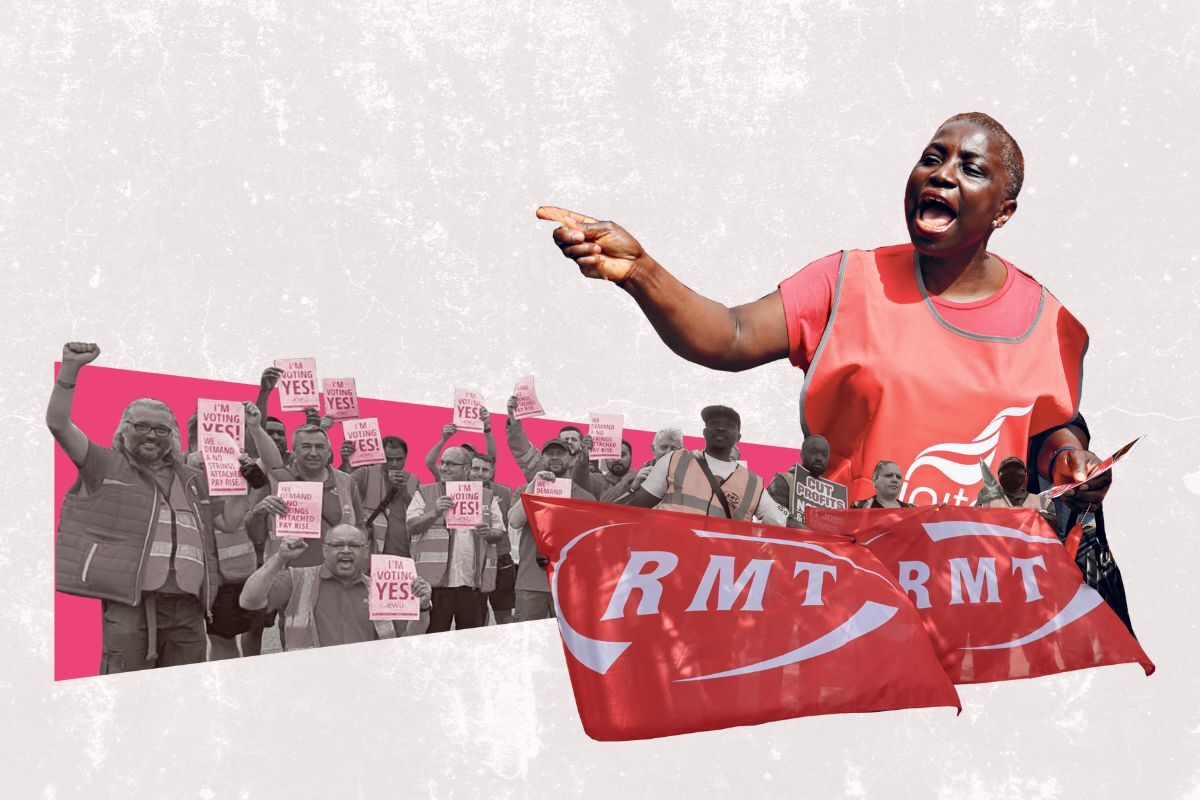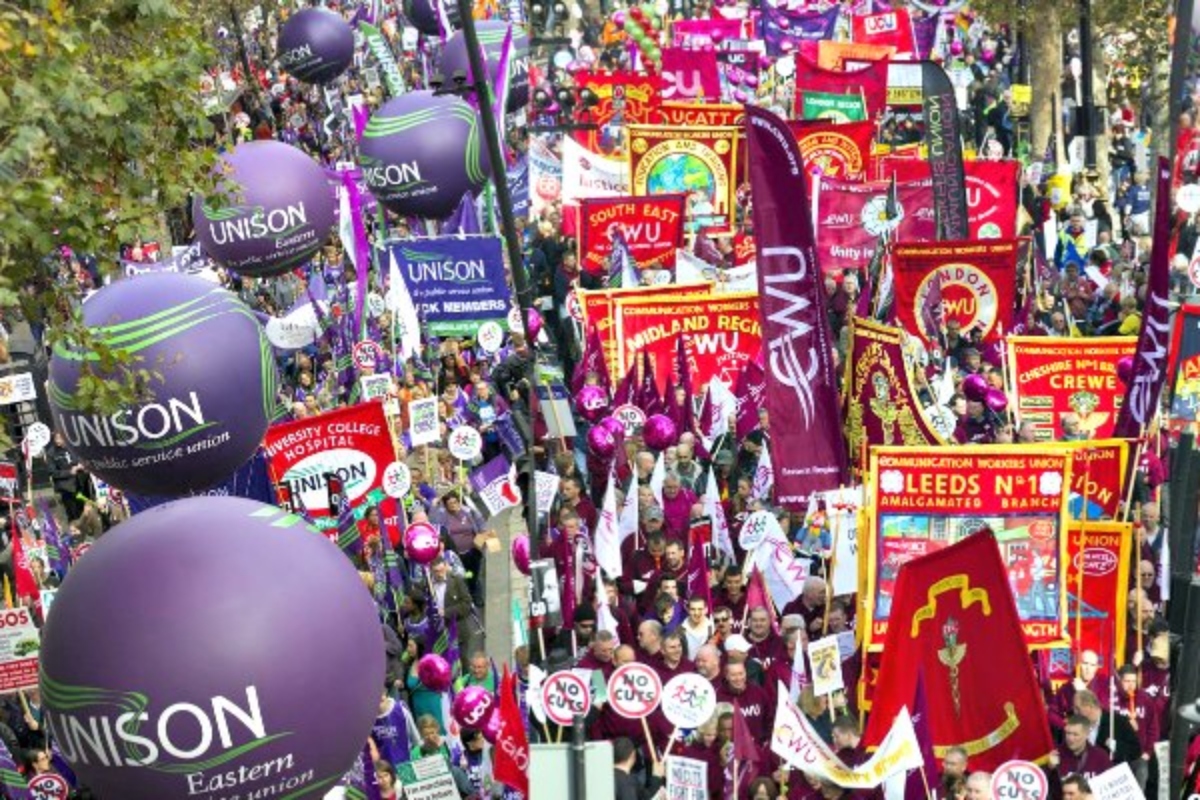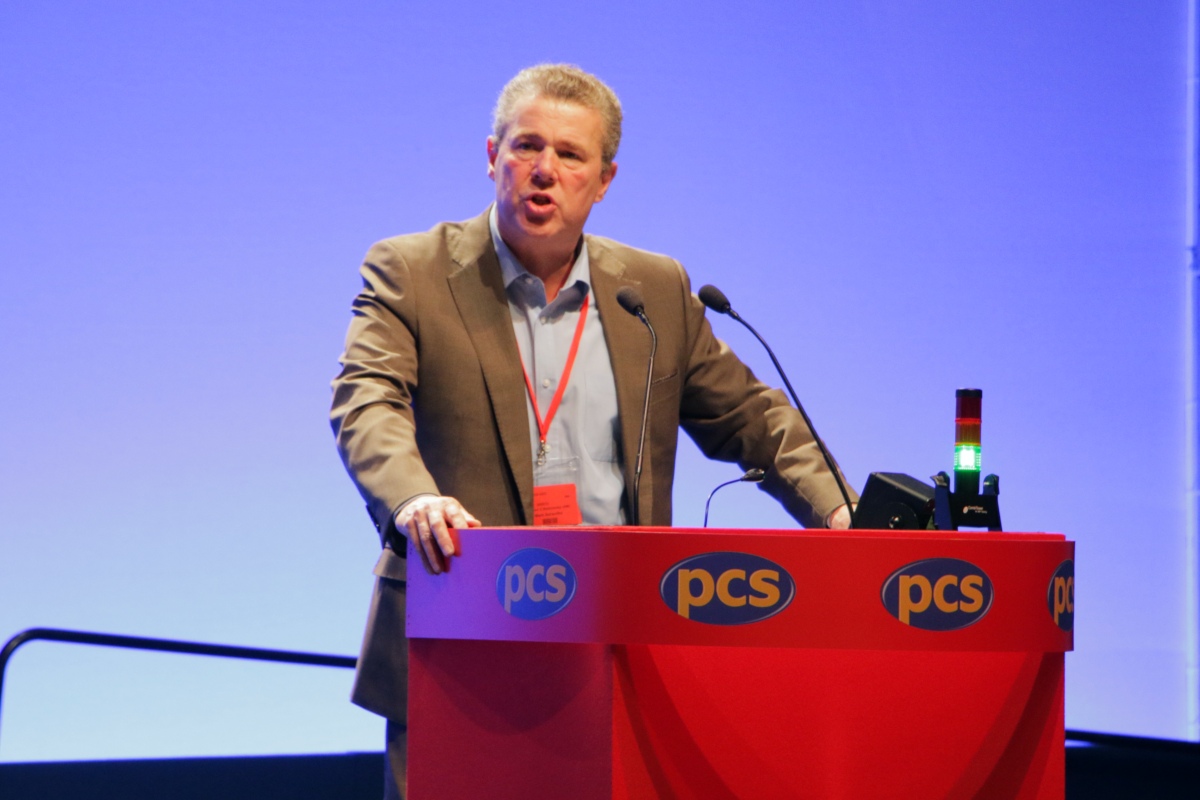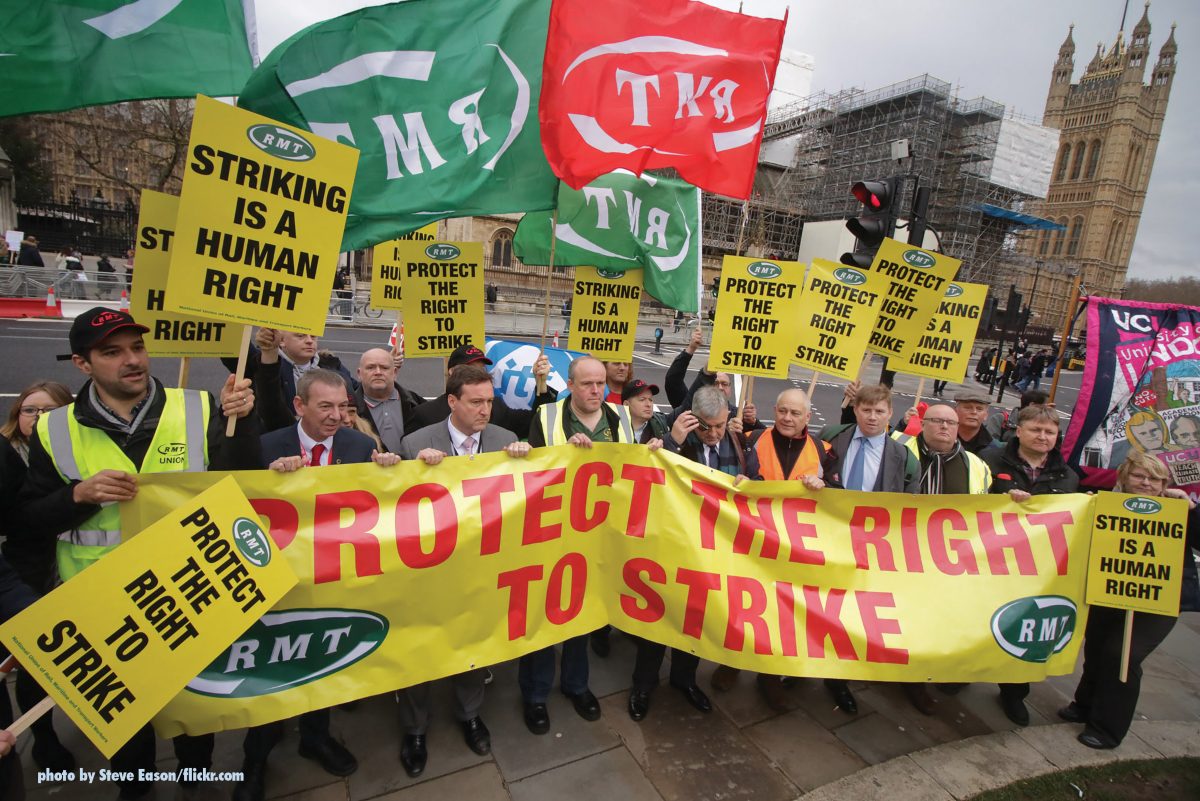This year’s TUC Congress, held against a stormy backdrop of political chaos and bitter class struggle, saw delegates vote for mass coordinated action. Trade union leaders must now translate words into deeds, and mobilise to kick out the Tories.
The first in-person TUC Congress since the pandemic took place this week in Brighton, from 18-20 October.
This comes at a historic time in Britain, with a resurgence on the industrial front not seen for generations, amidst a deep economic crisis and political chaos.
Following a ‘hot strike summer’, including the RMT’s national dispute and industrial action at Royal Mail, both of which are rumbling on, the country is set for a winter of discontent, and many more months of fierce class war.
“The flame flickers anew, the rebirth of the trade union movement has begun,” Unite general secretary Sharon Graham told delegates. “But we have to be serious about winning.”
This congress was therefore an opportunity for the trade unions to take stock of the struggles so far, discuss the challenges ahead, and prepare for the next offensive.
Coordinated action
 One recurring theme at this year’s event was the need for joint struggle, which was raised in a number of different motions.
One recurring theme at this year’s event was the need for joint struggle, which was raised in a number of different motions.
A composite motion backed by Unison, Unite, PCS, the bakers’ union, and POA was passed unanimously, for example. This called for the TUC General Council to organise “a special working group of willing unions” to coordinate a campaign of action over pay and conditions.
The motion also called for this working group to organise “further demonstrations, national and regional rallies, and coordinated industrial action where possible”.
A more detailed composited motion titled “Rebuilding industrial power, supporting collective action, and fighting for a new deal for workers” was put forward by CWU and Unite, and backed by the RMT, PCS, and NEU. This was also passed unanimously on Wednesday morning.
This committed leaderships to “actively encourage, facilitate, organise, support industrial coordination and a united campaign of coordinated industrial action between unions”.
The same motion also demanded that a “programme of ‘town hall’ meetings and rallies across the country” be organised; that the trade union movement “launch innovative forms of collective action that all workers can participate in before the end of 2022”; and that the unions should mount “the biggest recruitment campaign ever”.
“We must lead – as the organised working class – the entire working class,” RMT general secretary Mick Lynch stated, speaking in support of the motion.
“Now is the time for the TUC and unions to take bold and radical action,” Fran Heathcote, President of PCS, said. “With more unions set to ballot over the next few months, the potential for large-scale coordinated action is huge.”
Words and deeds
 This is a welcome development, building on the coordinated action that has already begun, such as that seen on 1 October between rail unions and postal workers.
This is a welcome development, building on the coordinated action that has already begun, such as that seen on 1 October between rail unions and postal workers.
The trade union leaders must now act to ensure that this official TUC policy is properly carried out.
Warnings were given by some left union leaders, however, of what should be expected if the TUC drags its feet or proves to be an obstacle.
“We need an uprising. We need a whole wave of synchronised, coordinated action,” Mick Lynch asserted at a fringe meeting held on Tuesday. “I don’t care what it’s called, and I don’t care if Paul Nowak [TUC deputy general secretary] or Frances [O’Grady, TUC general secretary] are the ones to coordinate it, as long as they don’t get in the way.”
To ensure that words are translated into deeds, grassroots activists must mobilise and organise across the labour movement.
This should include close coordination at the membership level, through the establishment of rank-and-file committees in all workplaces and industries, in order to bring the unions together from top to bottom.
Public sector
 Given the threats of further austerity already made by the Tories, with Jeremy Hunt recently announcing the need for billions more in so-called “efficiency savings” across government departments, another key aspect of the Congress was how the unions would resist further attacks on public services.
Given the threats of further austerity already made by the Tories, with Jeremy Hunt recently announcing the need for billions more in so-called “efficiency savings” across government departments, another key aspect of the Congress was how the unions would resist further attacks on public services.
In particular, the PCS came out fighting in response to the government’s proposed cut of 91,000 jobs in the civil service, calling for other unions to coordinate action against austerity where possible.
General secretary Mark Serwotka also promised that PCS members would join striking workers from other unions, if action is taken at a workplace where PCS organises. This kind of solidarity needs to be echoed by other unions also.
Anti-union laws
 Several motions also touched on the brutal tactics used by the bosses to attack workers, as well as the anti-union laws that exist to muzzle the labour movement.
Several motions also touched on the brutal tactics used by the bosses to attack workers, as well as the anti-union laws that exist to muzzle the labour movement.
One on the use of ‘fire and rehire’, put forward by UCU on Tuesday morning, called on the TUC to lead “an industrial response, involving coordination of industrial action by unions fighting such employment practices”, as well as demanding legislative reform to remove “the ban on solidarity action”.
Speaking in support, Unite delegate and Socialist Appeal supporter Arsalan Ghani spoke of how fire and rehire has “spread like a black mould” as part of the “all-out attack on workers by capitalists”.
Arsalan Ghani, Unite delegate and Socialist Appeal supporter speaking on a motion opposing fire and rehire and for workers rights
“Rosa Luxemburg once said those who do not move, do not notice their chains. Now we are moving and we do notice the chains made to stop us” #TUC2022 pic.twitter.com/TjoKSSlAQI
— Socialist Appeal (@socialist_app) October 18, 2022
“We remain shackled by the worst anti-trade union laws in western Europe,” Ghani stated. “Rosa Luxemburg once said those that do not move do not notice their chains. Now we are moving and we do notice the chains made to stop us.”
“If the Tories try to force workers legitimate activities outside of the law, don’t expect us to be bound by them,” the comrade boldly proclaimed, restating the position laid down by Unite in response to the Tories’ anti-union threats.
Another motion on workers’ rights in the wake of the P&O ‘jobs massacre’ saw Mick Lynch criticise the last Labour government for not repealing any of the anti-trade union laws.
“We demand our freedom,” Lynch said. He also gave a stark warning to the TUC, after Frances O’Grady announced that they would rely on the courts to fight the government’s planned anti-union legislation.
“Don’t trust the courts!” Lynch bellowed to applause. “It’s the same courts that write the anti-union laws!”
This explicit call to not trust the bourgeois legal system should be heeded. Judges are not friends of the working class, but of the bosses. They are not neutral arbiters, but tools of the establishment.
Arms industry
 One sour note from the conference was a motion committing the TUC to push for a rise in defence spending, in order to protect and create jobs in the UK arms industry.
One sour note from the conference was a motion committing the TUC to push for a rise in defence spending, in order to protect and create jobs in the UK arms industry.
Proposed by GMB and POA, and supported by Unite, the motion made no mention of the need to replace arms manufacturing with socially useful products, such as renewable energy and other vital technologies.
And shamefully, the speakers argued that the war in Ukraine was justification for supporting a boost in military expenditure – as if the labour movement’s main objection should not be against western imperialism providing weapons, but over the fact that the missiles and bombs dropping on civilians are not British-made.
Following a card vote, the motion narrowly passed. Those opposing it included the CWU, RMT, TSSA, FBU, UCU, NEU, NASUWT, and Unison.
As one NEU delegate correctly put it, speaking in opposition, increasing public spending on weapons is “not in the interest of the British working class, it’s in the interests of the international ruling class”.
Starmer’s Labour
 Numerous speakers called out Starmer’s Labour Party for failing to decisively stand in support of striking workers on picket lines.
Numerous speakers called out Starmer’s Labour Party for failing to decisively stand in support of striking workers on picket lines.
“I say to Labour, they must not stand on the sidelines and play it safe,” said Sharon Graham, speaking on Wednesday whilst proposing a motion on rebuilding industrial power. “This is the question of our time: whose side are you on?”
This same message was repeated within this motion, which stated: “The Labour Party should not stand on the sidelines but should support our picket lines at the heart of this struggle and workers taking strike action.”
With the Tories in turmoil, and Labour polling high by default, the next general election could well see Starmer enter Number 10. Yet as they get closer to power, the Labour leaders are only ramping up their pro-business rhetoric.
In his speech at the congress on Thursday morning, Starmer affirmed that a Labour government would see “a real partnership between government business and unions”, “supporting growth” and “economic stability”.
We need to “be the party of sound money”, the Labour leader asserted, reiterating his remarks from the party’s recent conference – code for “we want to be the party of big business”.
This highlights what a Starmer Labour government will mean for the working class: further austerity and attacks. And it shows that the trade unions will have to continue fighting for the interests of workers, no matter who occupies Downing Street.
Bring down the Tories!
 The situation was heating up even during the course of the congress.
The situation was heating up even during the course of the congress.
Not only did Liz Truss hand in her resignation letter on the final day of the event. But the Tories also announced the details of a new bill on minimum service levels during transport strikes. This is designed to hamper the ability of the unions to take effective strike action.
This comes on top of over 100,000 jobs in the firing line in the public sector, and 10,000 jobs threatened for the axe by Royal Mail bosses, in retaliation for the recent strikes by postal workers.
Coupled with a winter that could see millions fall into poverty, and even freeze to death, the trade union movement must now follow through with its mandate for a coordinated fightback.
The capitalist class is determined to make the working class pay for the crisis. The trade union leaders must show an equally iron will, and fight fire with fire.
As Lynch suggested, there needs to be a mass mobilisation of the whole class, including industrial action protests and demonstrations in every “city, town and village”.
Importantly, this campaign across the trade union movement should have the stated aim of bringing down this teetering Tory government and fighting for a socialist programme.
The motion passed on rebuilding industrial power also called for the TUC Executive and General Council “to sharpen the overall industrial and political demands of the campaign”.
Such a ‘sharpening’ should include the nationalisation of the big banks and top 100 monopolies – as part of a socialist plan of production, under democratic workers’ control.
This is the only solution to the never-ending crisis of capitalism, and the misery and toil it inflicts upon our class.






